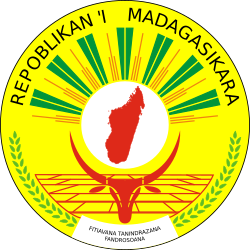| Candidate | Party | First round | Second round |
|---|
| Votes | % | Votes | % |
|---|
| Andry Rajoelina | Young Malagasies Determined | 1,954,023 | 39.23 | 2,586,938 | 55.66 |
| Marc Ravalomanana | Tiako i Madagasikara | 1,760,837 | 35.35 | 2,060,847 | 44.34 |
| Hery Rajaonarimampianina | Hery Vaovao ho an'ny Madagasikara | 439,070 | 8.82 | |
| Andre Christian Dieu Donne Mailhol | GFFM | 63,391 | 1.27 | |
| Joseph Martin Randriamampionona | Total Refoundation of Madagascar | 57,903 | 1.16 | |
| Ny Rado Rafalimanana | FOMBA | 57,476 | 1.15 | |
| Andrianiaina Paul Rabary | MIASA | 48,980 | 0.98 | |
| Randriamanantsoa Tabera | KINTANA | 48,705 | 0.98 | |
| Haingo Andrianjakamalala Rasolofonjoa | Avotra ho an'ny firenena | 47,932 | 0.96 | |
| Mamy Richard Radilofe | Roso ho amin'ny Demokrasia Sosialy | 42,748 | 0.86 | |
| Eliana Bezaza | Social Democratic Party | 40,882 | 0.82 | |
| Jean Ravelonarivo | Antokom-Bahoaka | 29,224 | 0.59 | |
| Lalaoarisoa Marcellin Andriantseheno | Tafajiaby | 28,252 | 0.57 | |
| José Michel Andrianoelison | ARO-RIAKA | 26,572 | 0.53 | |
| Richard Razafy Rakotofiringa | SJIAM | 26,534 | 0.53 | |
| Andriamparany Benjamin Radavidson | National Unity, Freedom & Development | 25,420 | 0.51 | |
| Saraha Rabeharisoa | Liberal Democratic Party | 23,685 | 0.48 | |
| Olivier Mahafaly Solonandrasana | PARRAINAGE | 23,437 | 0.47 | |
| Didier Ratsiraka | Association for the Rebirth of Madagascar | 22,222 | 0.45 | |
| Roland Ratsiraka | Malagasy Tonga Saina | 21,377 | 0.43 | |
| Serge Jovial Imbeh | Antoky ny Fivoaran'ny Malagasy | 18,962 | 0.38 | |
| Zafimahaleo Dit Dama Mahaleo Rasolofondraosolo | Manajary Vahoaka | 16,367 | 0.33 | |
| Omer Beriziky | Antsika Madagasikara | 15,352 | 0.31 | |
| Jean Jacques Ratsietison | Fahefa-Mividy no Ilain'ny Malagasy | 15,281 | 0.31 | |
| Erick Francis Rajaonary | Malagasy Miray sy Mifankatia | 14,758 | 0.30 | |
| Rivomanantsoa Orlando Robimanana | Madagsikara Vina sy Fanantenana | 14,561 | 0.29 | |
| Fanirisoa Ernaivo | ZAMA–PATRAM | 14,117 | 0.28 | |
| Arlette Ramaroson | PARRAINAGE | 12,645 | 0.25 | |
| Falimampionona Rasolonjatovo | FITAMBOLAGNELA/IAD | 12,276 | 0.25 | |
| Jean Max Rakotomamomjy | LEADER-Fanilo | 11,377 | 0.23 | |
| Rolland Jules Etienne | Madagasikara Fivoarana | 10,756 | 0.22 | |
| Bruno Rabarihoela | Fahazavan'i Madagasikara | 9,981 | 0.20 | |
| Roseline Emma Rasolovoahangy | Ezaka Mampandroso Antsika | 8,578 | 0.17 | |
| Jean Louis Zafivao | Gasy Mifankatia | 6,162 | 0.12 | |
| Stephan Narison | Antoko Gasy Miara Mandroso | 5,675 | 0.11 | |
| Solo Norbert Randriamorasata | Democratic Union of the Christians of Madagascar | 5,086 | 0.10 | |
| Total | 4,980,604 | 100.00 | 4,647,785 | 100.00 |
|
| Valid votes | 4,980,604 | 92.79 | 4,647,785 | 97.49 |
|---|
| Invalid/blank votes | 386,946 | 7.21 | 119,557 | 2.51 |
|---|
| Total votes | 5,367,550 | 100.00 | 4,767,342 | 100.00 |
|---|
| Registered voters/turnout | 9,949,083 | 53.95 | 9,913,599 | 48.09 |
|---|
| Source: Constitutional Court (first round, second round) |





